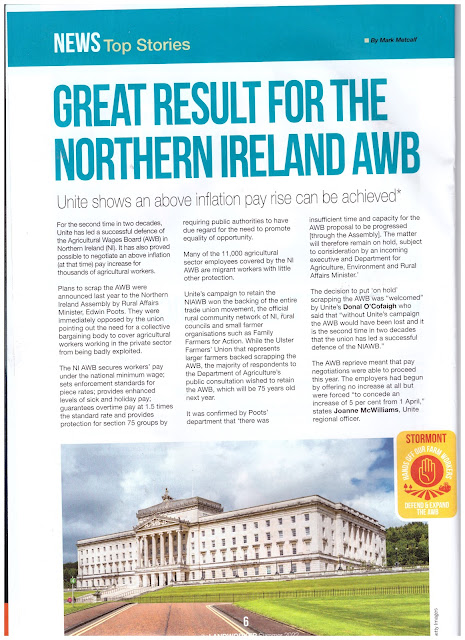GREAT RESULT FOR THE NORTHERN IRELAND AWB
UNITE shows an above inflation pay rise can be achieved *
For the second time in two decades, Unite has led a
successful defence of the Agricultural Wages Board (AWB) in Northern Ireland.
(NI) In doing so it has also proved possible to negotiate a 5% pay increase for
thousands of agricultural workers.
Plans to scrap the AWB were announced last year to the
Northern Ireland Assembly by Rural Affairs Minister, Edwin Poots. They were
immediately opposed by the union pointing out the need for a collective
bargaining body to cover agricultural workers working in the private sector
from being badly exploited.
The NI AWB secures workers’ pay under the national minimum
wage; sets enforcement standards for piece rates; provides enhanced levels of
sick and holiday pay; guarantees overtime pay at 1.5 times the standard rate
and provides protection for section 75 groups by requiring public authorities
to have due regard for the need to promote equality of opportunity.
Many of the 11,000 agricultural sector employees covered by
the NI AWB are migrant workers with little other protection.
Unite’s campaign to retain the NIAWB won the backing of the
entire trade union movement, the official rural community network of NI, rural
councils and small farmer organisations such as Family Farmers for Action.
Whilst the Ulster Farmers’ Union that represents larger farmers backed scrapping
the AWB, the majority of respondents to the Department of Agriculture’s public
consultation wished to retain the AWB, which will be 75 years old this year.
Poots required Assembly cross-party backing within the NI
Executive to proceed with his plans and was struggling badly to achieve
sufficient support. Then in February, Paul Givan, the first minister of NI,
resigned as part of the Democratic Unionist Party’s opposition to the NI
Protocol. This automatically meant Deputy First Minister Michelle O'Neill, of
Sinn Féin, lost her position.
Whilst other ministers remained in place to run their
respective departments the move prevented the Northern Ireland Executive from
functioning properly. A new assembly will be elected on 5 May. Poots is seeking
re-election but on his last day in office it was confirmed by his department
that ‘there was insufficient time and capacity for the AWB proposal to be
progressed. The matter will therefore remain on hold, subject to consideration
by an incoming executive and Department for Agriculture, Environment and Rural Affairs
Minister.’
The decision to put ‘on hold’ plans to scrap the AWB was welcomed”
by Unite’s Donal O’Cofaigh, who is also a Fermanagh and Omagh Council District
Councillor for the Cross Community Labour Alternative Party. “The widespread
support we gathered means it is certainly not a given that abolition will be
adopted by the next Executive and it will meet greater opposition next time.
Without Unite’s campaign the AWB would have been lost and it is the second time
in two decades that the union has led a successful defence of the NIAWB.”
The AWB reprieve meant that pay negotiations were able to
proceed this year.
The employers had begun by offering no increase at all but
were forced “to concede an increase of 5% from 1 April,” states Joanne
McWilliams, Unite regional officer with lead responsibility for AWB workers.
“We also raised demands for extended bereavement leave
rights – which go way beyond what is available under Stormont law for other
workers – but vitally important to migrant agricultural workers – and there is
a meeting due when the employers will respond to that. If we secure this
additional right it will confirm the AWB delivers results outside general
legislation. These results show the continued relevance of the AWB.”
O’Cofaigh hopes that the Unite success in NI “will help
re-invigorate the campaign of our comrades in England to re-establish the AWB
there to the benefit of their agricultural workforce.”
Following the scrapping of the AWB by the 20101-15 Tory-Lib
Democratic Coalition Government, agricultural workers in England are the only
part of the UK not covered by a collective bargaining structure. Young workers
in particular in England have lost out badly.
Northern Ireland AWB pay rates from 1 April 2022
Grade 1 - Minimum rate
Applicable for the first 40 weeks cumulative employment -
£6.95 per hour
Grade 2 - Standard worker
£7.49 per hour
Grade 3 - Lead worker
£9.36 per hour
Grade 4 - Craft Grade
£10.06 per hour
Grade 5 - Supervisory Grade
£10.59 per hour
Grade 6 - Farm Management Grade
£11.50 per hour
Should the National Minimum Wage or the National Living
Wage, as applicable, become higher than the hourly rates set out above then the
hourly or other minimum rate will default to the National Minimum Wage or
National Living Wage, whichever applies.
For more information contact the Unite Belfast office on
02890 232381
·
At the time of the negotiation, January 2022 inflation
was below 5 per cent.

.jpg)
No comments:
Post a Comment